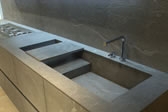
Stone sinks (including granite) are relatively expensive and heavy – but they look amazing in the right setting, are extremely durable and are very hygienic.

What is granite?
Great for the aesthetic of your kitchen, granite is a coarse, dense type of rock that can be carved and polished to create stunning, smooth finished sinks and benches. While the term ‘granite’ technically relates to a specific kind of pink-to-grey rock, the name is very commonly used to refer to any number of similar igneous-type rocks with large crystals, meaning that ‘granite’ sinks are available in all kinds of colours and finishes.
What is marble?
Marble is a different type of rock to granite in that it’s a ‘metamorphic’ rock rather than an igneous one. Marble’s composed of calcite, dolomite or serpentine, and like granite, can be smoothed and beautifully polished. Marble has a very distinct colour and texture, and is highly prized as a construction material – something that’s reflected very clearly in its high price tag.
What other types of stone are used for sinks?
Soapstone is also particularly popular, and other alternatives including things like travertine and onyx. Many people who choose stone also opt for a natural stone which is local to the area, in order to give their house a sense of belonging to the location.
How do stone sinks compare to other types of sinks?
Marble, soapstone and granite sinks are all easy to clean, and aesthetically speaking, they’re a very nice complement to any type of stone benchtop. Because granite and marble are types of stone, they’re quite heavy. Depending on how the rest of your kitchen’s constructed, stone sinks in general may need some special support.
Stone sinks are incredibly hard wearing, and are unlikely to significantly chip or scratch unless they take a real beating – although some stone sinks are harder than others, and grit can easily cause fine surface scratching. Stone does an excellent job of soundproofing and keeping in heat.
Both granite and marble (among other types of stone) are quite porous, which means they’re liable to absorb spills and will stain if the wrong things are spilled on them – particularly if liquids are left to sit. Stone sinks will need to be properly treated and sealed to ensure that they’re not at risk from staining as a result from water.
What styles of kitchen suit stone sinks?
Stone sinks, particularly marble and to a lesser extent granite, are considered something of a ‘luxury’. Stone offers a very particular, modern look. Stone is highly prized for modern style kitchens, but in the right setting could easily be made to suit other kitchen design styles.
An affordable alternative to a solid stone sink is one made of an acrylic material, or a quartz-based engineered stone surface. Quartz-based manmade stone has the added advantage of being considerably stronger and less porous (and therefore more stain resistant) than natural stone like granite.
|
Advantages
|
Disadvantages
|





